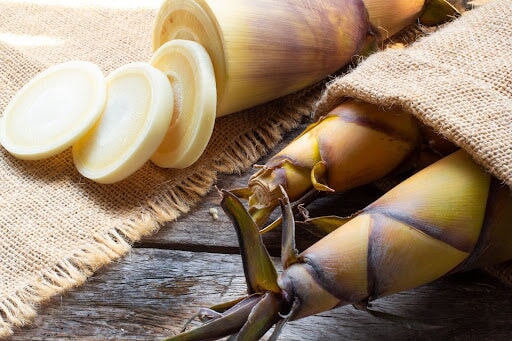
TLDR
Have you ever wondered, is bamboo edible? Enter bamboo shoots.
Bamboo shoots, often seen peeking out in an Asian-inspired dish, are more than just a culinary delight. They are a testament to the versatility and richness of bamboo, a plant that has woven its way into various aspects of human life. This article dives into the world of edible bamboo shoots, exploring their historical significance, nutritional benefits, culinary uses, and the sustainability aspect of bamboo, which is also exemplified in eco-friendly household paper products like Reel Paper’s bamboo toilet paper.
As we embark on this journey, we'll uncover the myriad ways in which this extraordinary plant influences our diet, culture, and environmental practices. From its humble beginnings as a fresh bamboo shoot in the forest to its transformation into a key ingredient in kitchens around the world, bamboo shoots represent a fusion of nature's ingenuity and human innovation.
What Are Bamboo Shoots?
Bamboo shoots are the edible shoots of the bamboo plant, which are essentially the young bamboo culms that emerge from the ground. They are a popular ingredient in many Asian dishes, prized for their unique flavor and texture.
Historical Significance in Asian Cuisine
In many East Asian and Southeast Asian cultures, bamboo shoots, or the edible shoots of the bamboo plant, have been a staple ingredient for centuries. They are valued not only for their unique texture and mild flavor but also for their cultural significance. Bamboo, being a symbol of resilience and longevity in Asian traditions, makes its shoots a revered vegetable in regional cuisines. These shoots have found their way into an array of iconic dishes, from the bamboo-laden stir-fries of China to the sumptuous bamboo shoot curries of India. In Japan, bamboo shoots, known as 'takenoko', are celebrated during the spring season, signifying growth and renewal. Similarly, in various Southeast Asian cultures, bamboo shoots are essential in communal and festive cooking, reflecting their integral role in both daily diets and culinary heritage. Bamboo shoots have been a part of traditional cuisine in India for centuries, particularly in the Northeast region, where they are used in various dishes, showcasing the rich and diverse culture of the area.
Nutritional Benefits of Bamboo Shoots
Beyond their culinary appeal, bamboo shoots offer a wealth of nutritional benefits that are essential for a healthy diet. Here, we will explore the rich nutritional composition of bamboo shoots, examining the various nutrients they contain and their impact on overall health. From their low-calorie profile to their rich fiber content, bamboo shoots are more than just a tasty ingredient - they are a powerhouse of essential vitamins and minerals.
Nutritional Composition
Bamboo shoots are a nutritional powerhouse. They are low in calories but rich in dietary fiber, making them an excellent choice for a healthy diet. The shoots contain vitamins such as Vitamin B6 and essential minerals like potassium and copper, making them a nutritious addition to any meal. Apart from these, bamboo shoots are also a good source of protein and a rich supply of essential amino acids. They have a high water content too, which helps in keeping the body hydrated and aids in digestion. Their low sugar content makes them suitable for people who are monitoring their carbohydrate intake, such as those with diabetes.
Health Benefits
The nutrient profile of bamboo shoots contributes to numerous health benefits. They have been known to aid in reducing bad cholesterol levels and are beneficial for gut health due to their high fiber content. Furthermore, their low saturated fat content makes them a heart-friendly food option. The dietary fiber present in bamboo shoots not only aids digestion but also helps in maintaining a healthy weight, making them a valuable component of weight management diets. Additionally, the antioxidants found in bamboo shoots can help combat oxidative stress, potentially reducing the risk of chronic diseases. Their anti-inflammatory properties also make them a beneficial food for those suffering from inflammatory conditions.

Bamboo in Cooking and Cuisine
Bamboo shoots have long been a versatile and cherished ingredient in cooking, particularly in Asian cuisine. From traditional dishes to contemporary culinary creations, we'll see how bamboo shoots have been transforming meals with their unique flavor and texture.
Preparing Bamboo Shoots
Preparing bamboo shoots for cooking involves removing the tough outer layers to reveal the tender core. They can be boiled to soften and reduce their natural bitterness. Once prepared, bamboo shoots can be used in various culinary applications, from stir-fries to soups. It’s important to note that fresh bamboo shoots should be cooked thoroughly to remove any potential toxins [7]. For added convenience, canned bamboo shoots are available and can be used directly in cooking, though they often lack the freshness and crisp texture of their freshly harvested counterparts. Experimenting with different cooking methods like steaming or sautéing can also bring out unique flavors and textures in bamboo shoots.
Bamboo Shoots in Recipes
Bamboo shoots add a distinct texture and flavor to dishes. In Asian cuisine, they are often found in recipes alongside ingredients like soy sauce, pork belly, and coconut milk. From the savory stir-fries of Southeast Asia to the aromatic curries of South Asia, bamboo shoots enhance the taste and nutritional value of these dishes. In addition to traditional Asian recipes, bamboo shoots can also be incorporated into salads for a crunchy texture or used as a vegetable in pasta dishes and casseroles. Their versatility makes them an excellent ingredient for vegetarians and meat-eaters alike, offering a refreshing crunch and subtle earthiness to a variety of culinary creations.
The Sustainability of Bamboo
The sustainability of bamboo goes far beyond its culinary uses, playing a pivotal role in environmental conservation and responsible resource management. Be it how fast bamboo can grow, what bamboo is used for, and how it compares to traditional wood sources, bamboo has unique characteristics that not only make it a sustainable choice but also position it as a key player in the movement towards a greener, more sustainable future.
Bamboo as a Sustainable Resource
Bamboo's rapid growth rate and low environmental impact make it a highly sustainable resource. Certain types of bamboo, like Giant Bamboo, can grow several inches in a day, making them a renewable source much quicker than traditional wood sources. The sustainability of bamboo extends to its ability to thrive without the need for fertilizers or pesticides, making it an environmentally friendly choice for farming. Moreover, bamboo plays a crucial role in biodiversity as it provides a habitat for various wildlife species. Its deep root systems help in soil stabilization and preventing erosion, making it a key player in maintaining ecological balance.
Bamboo vs. Traditional Wood
Compared to traditional wood sources, bamboo stands out for its sustainability. It requires less fresh water, pesticides, and space to grow, and it helps in soil conservation. This makes bamboo a more eco-friendly choice, as seen in products like bamboo toilet paper, which offers a sustainable alternative to wood-based paper products. The use of bamboo in place of wood can significantly reduce deforestation and the carbon footprint associated with timber harvesting. Bamboo’s shorter maturity cycle ensures that it can be harvested repeatedly over several years without causing environmental degradation, making it a more sustainable option for long-term use in industries ranging from construction to paper production.
Discover Reel Paper's Bamboo Toilet Paper
Embracing the sustainability and versatility of bamboo, Reel Paper offers bamboo toilet paper, a product that aligns with the growing consumer demand for environmentally responsible choices. Made from bamboo, this toilet paper is not only soft and strong but also a testament to how everyday products can contribute to effective sustainable living. By choosing Reel Paper, consumers support a movement towards greener, more eco-conscious living, making a positive impact with each roll.
In addition to bamboo toilet paper, we also offer a range of eco-friendly products, including our recycled paper towels and recycled facial tissues, which further exemplify our commitment to sustainability. Each product, thoughtfully designed and responsibly sourced, represents Reel Paper's dedication to offering consumers environmentally friendly alternatives in their everyday lives. Whether it's choosing bamboo-based toilet paper or opting for recycled or bamboo paper towels, consumers can trust Reel Paper to deliver quality and sustainability in each sheet.
Sources:
- Guo, Sally. 2021. “Bamboo - Symbol of Chinese Culture, Bamboo Symbolism.” Www.chinatravel.com. May 30, 2021. https://www.chinatravel.com/culture/chinese-bamboo-symbolism.
- Closs, Christian. 2022. “Japan’s Bamboo Shoots: Dishes, History & Symbolism - Sakuraco.” Sakuraco. February 11, 2022. https://sakura.co/blog/bamboo-shoots-as-seasonal-food-in-japan/.
- Acharya, Biswajeet, Amulyaratna Behera, Prafulla Kumar Sahu, Fahima Dilnawaz, Suchismeeta Behera, Bimalendu Chowdhury, and Durga Prasad Mishra. 2023. “Bamboo Shoots: An Exploration into Its Culinary Heritage in India and Its Nutraceutical Potential.” Journal of Ethnic Foods 10 (1). https://doi.org/10.1186/s42779-023-00190-7.
- Ajmera, Rachael. 2021. “Bamboo Shoots: Nutrients, Benefits, and More.” Healthline. May 14, 2021. https://www.healthline.com/nutrition/are-bamboo-shoots-good-for-you#nutrition.
- Bharat, Divya. 2022. “5 Incredibly Healthy Reasons Why You Should Eat Bamboo Shoots.” Netmeds. March 2, 2022. https://www.netmeds.com/health-library/post/5-incredibly-healthy-reasons-why-you-should-eat-bamboo-shoots.
- Tundis, Rosa, Giuseppina Augimeri, Adele Vivacqua, Rosa Romeo, Vincenzo Sicari, Daniela Bonofiglio, and Monica Rose Loizzo. 2023. “Anti-Inflammatory and Antioxidant Effects of Leaves and Sheath from Bamboo (Phyllostacys Edulis J. Houz).” Antioxidants 12 (6): 1239. https://doi.org/10.3390/antiox12061239.
- Hornady, Fred. 2021. “Shoot to Kill: Are Bamboo Shoots Poisonous?” Bambu Batu. May 28, 2021. https://bambubatu.com/shoot-to-kill-are-bamboo-shoots-poisonous/.
- Council of Fashion Designers of America. 2019. “Bamboo | Materials Index.” Cfda.com. 2019. https://cfda.com/resources/materials/detail/bamboo.
- Schröder, Stéphane. n.d. “Bamboo Prevents Soil Erosion and Restores Degraded Land.” Guadua Bamboo. https://www.guaduabamboo.com/blog/bamboo-prevents-soil-erosion-and-restores-degraded-land.
- Dromgoole, Zoe. 2022. “The Sustainability of Bamboo: A Comprehensive Guide.” Unsustainable Magazine. May 25, 2022. https://www.unsustainablemagazine.com/sustainability-of-bamboo/.




0 comments